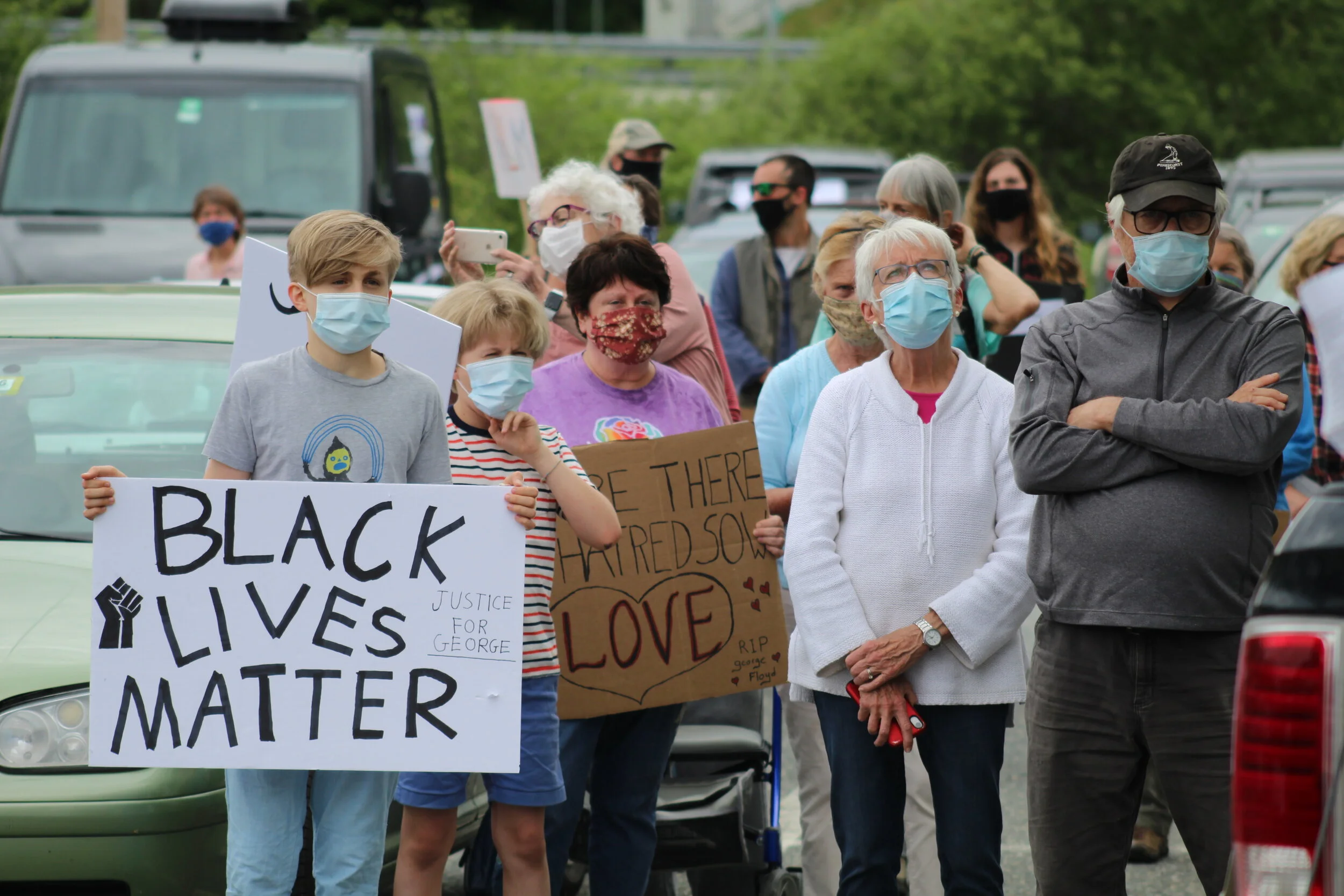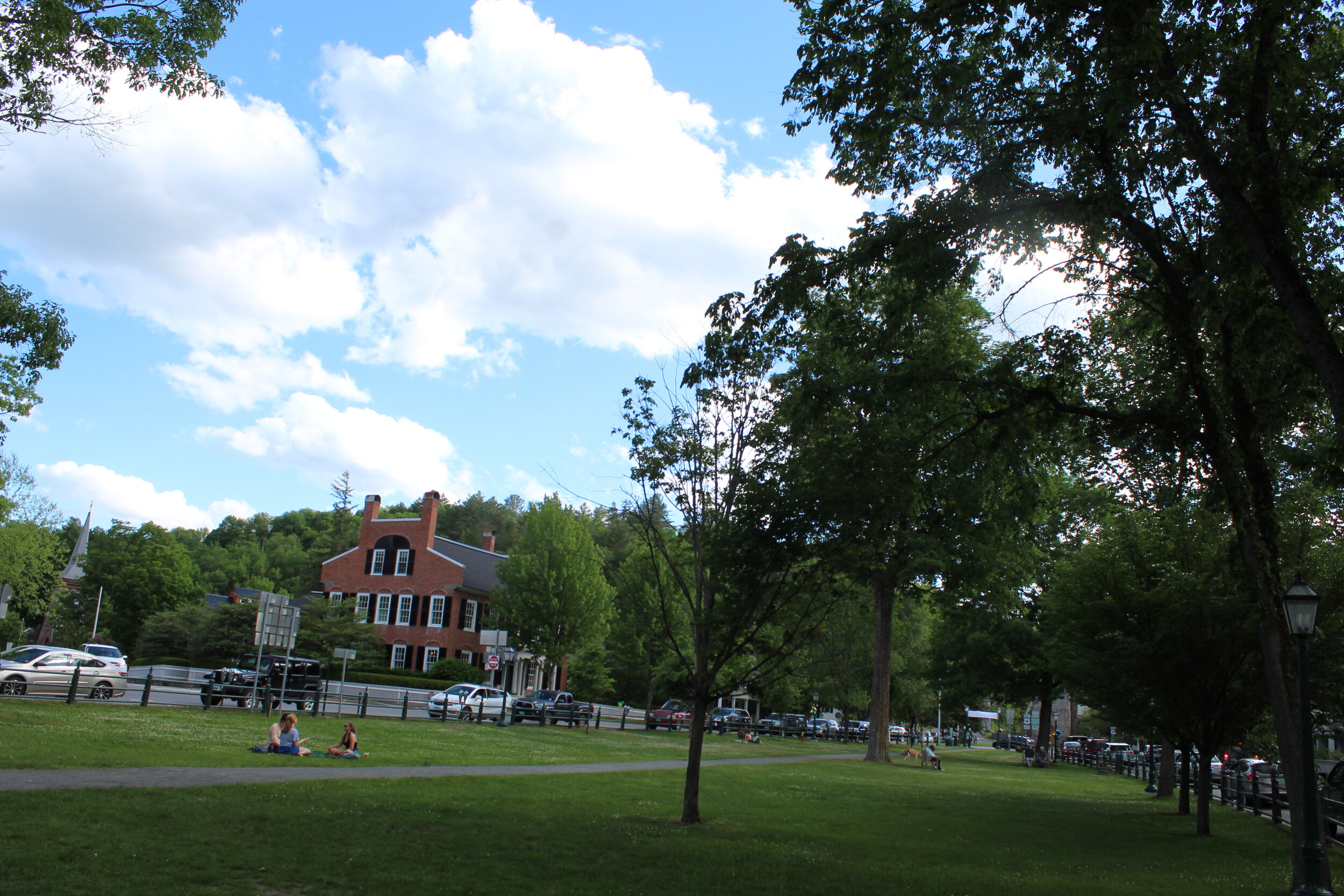Woodstock kicks off weekly BLM vigil
A weekly Black Lives Matter vigil kicked off on Monday in Woodstock, Vermont, with the goal of continually showing solidarity with the movement.
Participants display their signs at Monday’s Black Lives Matter vigil in Woodstock, Vermont. At right, Willa Nohl and Ashley Murray (at far right) hold up the large BLM sign. (Gareth Henderson Photo)
A weekly Black Lives Matter vigil kicked off on Monday in Woodstock, Vermont, with the goal of continually showing solidarity with the movement.
Going forward, the vigil will be held each Monday from 5 to 5:30 p.m. at Tribou Park in Woodstock Village, at the intersection of Pleasant Street and Route 4. Many in the Woodstock community have been active supporters of Black Lives Matter, attending multiple events earlier this year in support of social justice in the wake of George Floyd's killing in Minneapolis. That included a Black Lives Matter car rally in Woodstock on the day of Floyd's funeral in June. Protests and vigils were also held in a number of other Upper Valley towns, some drawing large crowds.
The move to hold a Woodstock vigil each week started with local resident Mary Corrigan, who noted the nearby New Hampshire towns of Hanover, Lebanon and Canaan hold their own events regularly in support of BLM.
"I wanted to keep it on people's minds," she said.
Corrigan and fellow organizer Peggy Fraser spread the word about the vigil, with help from some members of local group Women For A Change. About 30 people showed up at Tribou Park on Monday afternoon, with a number of passing motorists honking in support.
Area residents support Black Lives Matter at a vigil in Woodstock, Vermont, on Monday. At center, Woodstock resident Jane Curtis, 103, displays the sign, “Know Justice, Know Peace.” Organizer Mary Corrigan is shown at far left. (Gareth Henderson Photo)
The vigil was organized prior to the death of Supreme Court Justice Ruth Bader Ginsburg on Friday. At Monday's event, Fraser invited people at the vigil to fill out name tags with Ginsburg's name and wear them, in honor of her legacy.
Ashley Murray, a Mendon resident who helped hold up a large Black Lives Matter sign, said Ginsburg's many years of tireless work for justice were particularly poignant now.
"Her cases have done a lot to expand rights for a lot of people, and it's important to support that idea, which may now be threatened from a judicial perspective," Murray said.
At one point, a motorist drove by the vigil, rolled down the window and yelled, "Trump, Trump, Trump!", and then left. Murray said it's "disheartening" to see evidence of the political division in the country.
"I'd love to see people come together and see that it's for everybody," she said of Black Lives Matter. "It's basic human rights for everyone."
Pamela Fraser, of Barnard, whose mother, Peggy, helped organize the vigil, said the political climate makes it even more important to come out and support the movement for social change.
"It's strange to me that it's become political to support ending injustice," Pamela Fraser said.
She was encouraged by the community's support of these efforts on Monday.
"I'm glad to see people still caring."
— Gareth Henderson
A desire for change
By joining together in calls for justice, we keep building the momentum this movement needs, toward the unity our future requires.
Community members gather for a recent rally in Woodstock, Vermont. (Gareth Henderson File Photo)
Yesterday I wrote about the power of younger voices demanding racial justice, and today, I’m encouraged Vermonters are strengthening that movement and momentum is building.
A week after the words “Black Lives Matter” were painted on the road leading to the White House, the street facing the Vermont State House now bears the same message. Over 100 people reportedly gathered on Saturday morning to paint the words. The 20-foot message in yellow paint is unavoidable when going to the State House or passing by, which means many people will see the words every day, including those running the government.
This is important, because we need reminders large and small, so that the awareness of inequality and injustice stays at the forefront of our minds as a community. That’s the basic requirement to move toward the change many Americans are demanding. The vandalism of the new mural, reported on Sunday, is a reminder of the challenges that lie ahead.
These issues are on the minds of lawmakers in our state, though it’s not yet clear what statewide proposals will come. Windsor County Sen. Alison Clarkson spoke at a recent rally in Woodstock.
“We are all committed to changing our world one bill at a time, one life at a time,” she said, including her fellow legislators.
In related news, the deadline passed on June 12 for applicants to the Racial Equity Task Force announced by Gov. Phil Scott this month following the national outcry about the death of George Floyd in Minneapolis. The panel will be chaired by Xusana Davis, the state’s executive director of racial equity. The state appears to be moving on this quickly, so hopefully an announcement will come soon once all the members are selected.
As the governor has said, the racial equity task force isn’t the whole solution for Vermont, but it’s a starting point. In response to a reporter’s question last week, he emphasized that we all have a role to play in addressing racism. Just declaring, “I’m not a racist,” is not sufficient, Scott said at the Wednesday briefing.
“That’s not enough anymore,” he said. “What we need to do is be anti-racist, and we need to take action. It’s long overdue.”
The unavoidable Black Lives Matter mural on the street in Montpelier shows a strong desire for meaningful change, and a desire to remind those in power, and those they represent, that this issue is not going away. By joining together in those calls for justice, we keep building the momentum this movement needs, toward the unity our future requires.
— Gareth Henderson
Following their lead
Change is putting down roots. It’s time to help them grow.
A few people gather on the Green ahead of the graduation parade in Woodstock, Vermont, on Friday. Young people have played a major role in protests for racial justice. (Gareth Henderson Photo)
“I follow his lead.” Those words were spoken by Rev. Leon Dunkley at the Black Lives Matter rally in Woodstock, Vermont, last Tuesday. And they are the words I remember most from that afternoon, because he was referring to Tripp Overbay, a third-grader who has rallied his community around stopping racism and taking action for justice.
It was an impactful recognition of the courage of the young people who have powered this new movement for justice, equality and unity after George Floyd’s death in Minneapolis. We need their voices, and we need them every day, in order to stay focused on participating in this national push for change. As Tripp and others have said, part of that push will be in smaller steps which lead to the larger goal.
One of those steps — and a hugely important one — is education, learning about what led us here. It is essential for white people like myself to understand the problem, to understand why life in the U.S. is different for our brothers and sisters of color. That is foundational to national progress on this issue, because one must understand a problem, in order to help resolve it and inspire others to do the same.
This week, I took great inspiration from PBS NewsHour’s Friday coverage of the Black Lives Matter movement through the eyes of young Americans. One segment featured video statements by teenagers about the racial justice movement, and one important theme was conversations. Talking with family and friends about the tough issues, though sometimes difficult, will be key as the country tries to move forward. It is part of the path toward real understanding.
I’m proud to say, I think many Vermonters are heading down that path, but of course, there is a vast amount of work to be done, here and throughout the country. It includes addressing injustices in housing, education, government and a host of other parts of society. But I’m greatly encouraged by the younger generations who are propelling us forward, and I hope more and more Americans will follow their lead, with love and compassion underpinning the work. Change is putting down roots. It’s time to help them grow.
— Gareth Henderson






